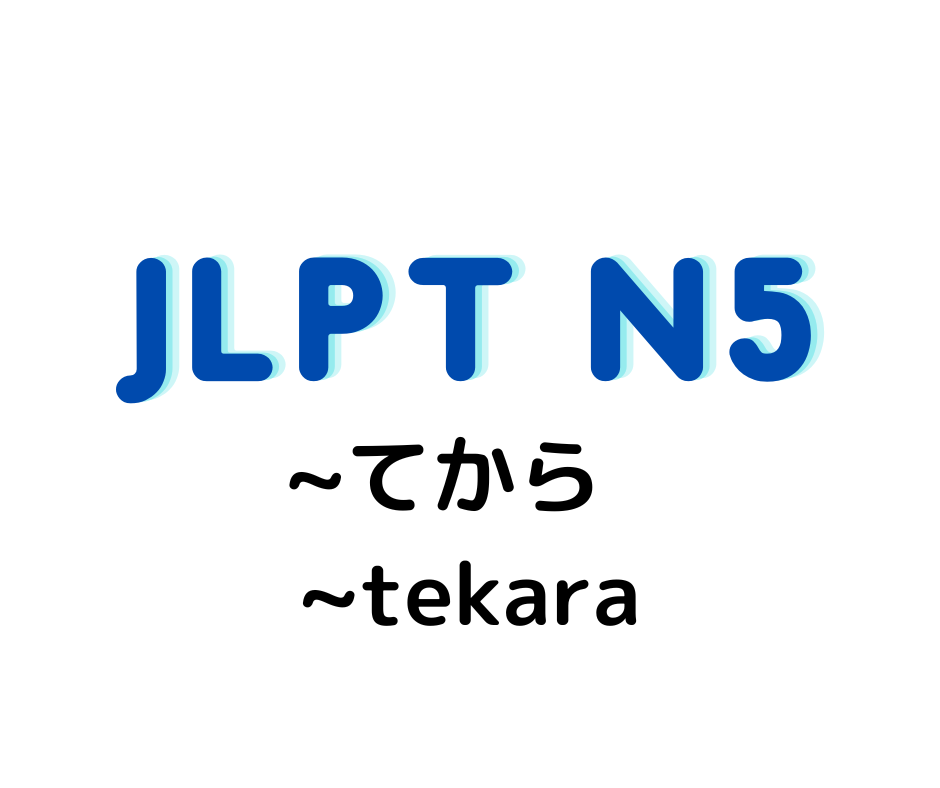sentence pattern: ~てから / ~tekara
Grammar Type:
Conjunction
Essential Meaning:
After X / Having done X / Since doing X
Construction:
Verb て-Form + から
E.g. 話はなしてから [After speaking]
E.g. 食たべてから [After eating]
NOTE
- てから is just an extension of から (Starting point / Source) where one action serves as the starting point for another action. Unlike から (Reason / Cause), てから does not imply causality; it merely indicates that Sentence 1 occurs earlier than Sentence 2 in the temporal sequence. It also implies a level of volitionality and planning on the part of the speaker.
- Sentence 1 てから, Sentence 2 translates to “After doing Sentence 1, Sentence 2“, “Since doing Sentence 1, Sentence 2“, or “Having done Sentence 1, Sentence 2“, depending on the context.
- E.g. 私は友達に電話してからうちを出た。[After calling my friend, I left my house.]
- E.g. 私たちがこの家を買ったからもう十年になる。[It’s already been ten years since we bought this house.]
- Be careful not to confuse てから with から (Reason / Cause). The two can look very similar but convey completely different meanings.
- E.g. ジョギングをしてからシャワーを浴びた。[After jogging, I took a shower.]
- E.g. ジョギングをしたからシャワーを浴びた。[Because I went jogging, I took a shower.]
- てから implies that the speaker has a high degree of volitional control over the main action in Sentence 2 and it places a strong emphasis on chronological order. The regular て-Form, on the other hand, conveys a more neutral description of events. So if the main verb in Sentence 2 does not strongly express the speaker’s wishes, desires, etc., から in てから can optionally drop to form the て-Form. However, if the main verb in Sentence 2 does convey the speaker’s volition (e.g. via a suggestion, command, request, etc.), から in てから cannot drop.
- E.g. *勉強が終わって、テニスをしましょう。[After studying, let’s play tennis.] This sentence is ungrammatical, because the て-Form can not be paired with a volitional verb form in sentence 2.
- E.g. 勉強が終わってからテニスをしましょう。[After studying, let’s play tennis.]
- E.g. *勉強が終わって遊びなさい。[After studying, go out and play.] This sentence is ungrammatical, because the て-Form can not be paired with a volitional verb form in sentence 2.
- E.g. 勉強が終わってから遊びなさい。[After studying, go out and play.]
- E.g. ジョギングをしてからシャワーを浴びた。[After jogging, I took a shower.] てから emphasizes the temporal sequence of events; the jogging took place before the shower, and this is important / relevant.
- E.g. ジョギングをしてシャワーを浴びた。[After jogging, I took a shower.] In this case, the て-Form conveys a neutral description of events. The fact that showering takes place after jogging is not particularly relevant.
Example Sentences
クリスは晩ご飯を食べてから映画に行った。
After Chris ate dinner, she went to a movie.
私は友達に電話してからうちを出た。
After calling my friend, I left my house.
ジョンはいつもシャワーを浴びてから寝ます。
John always goes to bed after taking a shower.
私たちがこの家を買ってからもう十年になる。
It’s already been 10 years since we bought this house.
二年前に交通事故を起こしてから、マークは車に乗らないようにしています。
Since causing a car accident two years ago, Mark has been avoiding riding in cars.



コメント